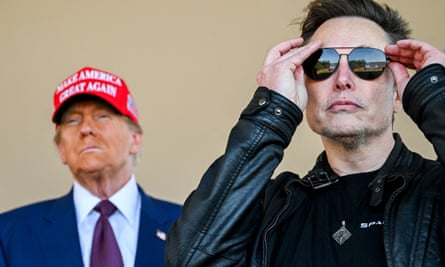Can US monopoly laws rein in Silicon Valley?
April 29, 2025
The European Union fined Apple and Meta hundreds of millions of dollars last week.
My colleague Jennifer Rankin reports:
The European Commission has fined Apple €500m (£429m) and Meta €200m for breaking rules on fair competition and user choice, in the first penalties issued under one of the EU’s landmark internet laws.
The fines under the EU Digital Markets Act (DMA), which is intended to ensure fair business practices by tech companies, are likely to provide another flashpoint with Donald Trump’s administration, which has fiercely attacked Europe’s internet regulation.
The Trump administration was indeed quick to rebuke the fines: a national security council spokesperson told Politico that the EU’s moves were a “novel form of economic extortion” that “will not be tolerated by the United States”.
Interesting, too, is that while the penalties are no small amount of money, their impact likely pales in comparison to the scrutiny the tech companies are facing in the US. Though the EU boasts more robust consumer protections when it comes to tech, the cases against these companies on their home turf, where they have enjoyed great latitude in the past, threaten their core corporate structure, which has been key to integrating their products with one another and creating the walled gardens that have earned them hundreds of billions of dollars.
Before Donald Trump ascended to the US presidency a second time, I would have predicted that little regulation of tech giants would emerge from his administration and that if there were any authority that would provide a check on Silicon Valley’s humongous and still growing influence, it would be Europe. That is not the regulatory landscape we find ourselves in, though. The US Department of Justice is engaged in serious pursuit of nearly every major American tech company for alleged monopolistic conduct. The bureau has filed suits against Apple, Amazon, Meta and Google within the past two years. Meta’s trial began two weeks ago and threatens to unwind its acquisitions of Instagram and WhatsApp.
Most severe – Google faces the consequences of losing two major antitrust cases in quick succession. The US has petitioned a judge to force the nearly $2tn company to divest one of its crown jewels, Chrome, the most popular web browser in the world.
The US wields the sharper sword here since the tech giants are headquartered there. Unlike the EU’s fines, the antitrust cases in the US threaten the corporate organization of the tech giants, which, if altered, would redirect the profits and change consumers’ experiences with their products. These massively profitable businesses have rolled over far larger fines like speed bumps – recall when the US Federal Trade Commission fined Facebook $5bn for privacy violations, which Mark Zuckerberg mentioned during a few subsequent earnings calls and then never again. Facebook continued operating largely as it did before. The EU fined Google fined €4.3bn in 2018 over Android’s preference for Google search. Apple was fined €1.8 just last year over music streaming payments.
A Chrome-less Google, on the other hand, would make for a less personalized experience of using the internet, I think, perhaps even for my fellow Safari users. YouTube and Google search could draw on less of your history. No other company serves ads in so many corners of the web, so the ads that follow you around would become quite different.
Read more here.
Two good essays on tech
The UK’s communications regulator attempts to protect children online
-
Ofcom announces new rules for tech firms to keep children safe online
-
What are the Ofcom measures to protect children online – and will they work?
-
Ofcom accused of prioritising interests of tech firms over child safety online
Tesla reports abysmal earnings at a pivotal moment for Musk

Elon Musk’s electric vehicle company reported its earnings for the first quarter of 2025 last week. The numbers were among the worst in its history. Via my colleague Johana Bhuiyan, here are the figures:
Tesla saw a 9% drop in revenue year over year in the first quarter of 2025. The company brought in $19.3bn in revenue, well below Wall Street expectations of $21.45bn. The company reported an earnings per share of 27 cents, also well under investor expectations of 43 cents in earnings per share.
Tesla profits also slid 71% to $409m compared with $1.39bn in net income the previous year.
The company suffered a 13% drop in vehicle deliveries, making it the company’s worst quarter since 2022. Tesla closed the quarter with 336,681 vehicles delivered.
The majority of Musk’s enormous net worth – he remains the world’s richest person despite a nearly $100bn decline in his fortune since the year began – consists of his partial ownership of Tesla. His shares in the company are worth quite a lot less than they were when Trump was inaugurated.
During a call with disappointed Wall Street investors after Thursday’s earnings figures, Musk said his work to get the US government’s “financial house in order is mostly done”. “Starting probably next month, May, my time allocation to Doge will drop significantly,” he added. He is scheduled to leave Doge on 30 May, amid a strict 130-day cap on his service as a special government employee.
The statement reminds me of the premature “Mission Accomplished” banner flown by former US president George W Bush soon after the disastrous Iraq war began: a declaration of victory that papers over a tumultuous reality very much still in flux. The success of Musk’s cost-cutting has yet to be determined. Four days before the earnings call, a federal judge in the US blocked his team’s efforts to shutter a top consumer financial protection agency. We do not yet know how much of his scything of the US federal government will remain in place.
Read more about Elon Musk
-
Elon Musk to pull back in Doge role starting May amid 71% dip in Tesla profits
-
Elon Musk’s xAI accused of pollution over Memphis supercomputer
The wider TechScape
-
AI images of child sexual abuse getting ‘significantly more realistic’, says watchdog
-
Meta faces Ghana lawsuits over impact of extreme content on moderators
-
Trump’s meme coin soars after he asks top 220 holders to dinner
-
Apple ‘aims to source all US iPhones from India’, reducing reliance on China
-
US food delivery app DoorDash offers to buy UK rival Deliveroo for $3.6bn
-
What to do if your phone is lost or stolen: practical steps to restore peace of mind
Search
RECENT PRESS RELEASES
Related Post




